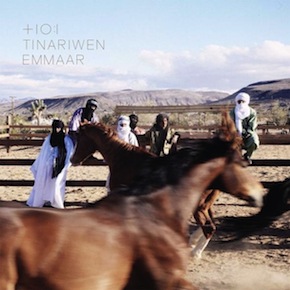When in late 2012 Tinariwen’s vocalist and guitarist Abdallah Ag Lamida was briefly arrested by "defenders of the faith" Ansar Dine, it was worrying proof that not even the country’s best known musicians were safe from the unrest in their native Mali. While the arrival of French troops last year may have driven out many of the extreme Islamist groups, things have been far from stable in Tinariwen’s homeland in the three years since their last LP.
Ag Lamida joined the group as temporary replacement for frontman Ibrahim Ag Alhabib, who had left to join the Azawad rebellion against insurgents in the country. During this time, anxious fans had been kept up to date as to how members of the group were getting on during the conflict via occasional social media updates ("We are all safe back home in Mali," read one Facebook status). Ag Lamida does not number among the group’s six-piece lineup on Emmaar (which translates as The Heat On The Breeze), but the record does mark the return of Ag Alhabib in the lead role. He is joined by original members (vocalists and guitarists Abdallah Ag Alhousseyni and Alhassane Ag Touhami) and a younger generation of musicians and longtime fans who joined in the 1990s – multi-instrumentalist Eyadou Ag Leche, guitarist Elaga Ag Hamid, and percussionist Said Ag Ayad.
Throughout Tinariwen’s 35 year career conflict has provided the inspiration for much of the group’s music. Ag Alhabib’s father, a Tuareg rebel, died in a 1963 uprising in Mali and during the 1980s and 90s members of the group swapped guitars for guns and became involved in numerous revolts. The young Ag Alhabib turned to music at an early age and built his first guitar out of a tin can, stick and bicycle brake wire. In 1979 he got a real guitar and joined other musicians to form Tinariwen, roughly translating from the Tamashek as the "people of the desert" – their only true home, having shifted as refugees across many countries encompassing the North African Sahara over many years. By playing at parties and weddings the group developed their signature style of Assouf (desert blues), weaving rich storytelling heavily shrouded in metaphors into songs about their nomadic lives speaking to the hearts of the nomadic Tuareg people.
Due to the instability back home, the album – their sixth, marks the group’s first recordings outside of North Africa. This time they have found another desert setting, relocating to Joshua Tree in California to record the album with producer Patrick Votan and mixer Vance Powell, who has also worked with Jack White and The Dead Weather.
‘Toumast Tincha (The People Have Been Sold Out)’ opens the album with a haunting spoken word intro by US poet Saul Williams, before leading into the familiar spiralling licks of electric folk music the group have made their own. The lyrical focus of the song takes inspiration from the ongoing troubles in Mali. "The ideals of the people have been sold cheap, my friends/a peace imposed by force is bound to fail/and gives way to hatred," sings Eyadou Ag Leche. The group’s distinctive desert blues is augmented here by Red Hot Chili Peppers guitarist Josh Klinghoffer, who fits into the hypnotic groove unobtrusively as multiple layers of sand-coated riffs unfold. The next track ‘Chaghaybou’ offers a more upbeat tempo as Abdallah Ag Alhousseyni takes over lead vocals and it is clear already that after the largely acoustic Grammy winning Tassili from 2011 that the group have lost none of their momentum.
Klinghoffer appears again on ‘Timadrit In Sahara’ (Youth Of The Sahara) as the group employ call and response vocals as a rallying call to the younger generation to take control of their destiny, one free of violence, "Now we will awake ourselves / we’ve learned how to use other weapons / than those our ancestors bequeathed to us." ‘Imidiwan Ahi Sigdim’ (Friends, Hear Me!) is a slower number with a steady organic flow and reflects on a loss of innocence, "You suffer the bitterness of that oppression/which annihilated the old folk/On whom you counted/and tortures the soul of the heart/that knows no hatred."
Fats Kaplin joins the group to add dizzying pedal steel guitar on ‘Sendad Eghlalan’ (This Constant Lethargy), evoking the sun scorched haze of the desert over the group’s lightly choppy rhythm guitars, ever unwinding solos and rolling patter of hand percussion. Fittingly, with a resigned drawl Ag Alhabib sings: "Rid yourselves of this constant lethargy / that annihilates body and soul / men of my country / you’re getting it all wrong." And Kaplin’s energetic fiddle playing brings a large dose of country from his native Nashville on the rousing ‘Imidiwanin ahi Tifhamam’ (Friends, understand me!) as Ag Alhousseyni takes lead vocals singing, "Friends, companions, understand me / Don’t think that I’m about to show any weakness." Chavez’ Matt Sweeney adds guitar on ‘Emajer’, his contribution again gelling well with his musical partners, as he complements their style rather than attempting to stamp his own sound on the track. The album closes with the acoustic ‘Agregh Medin’ (I Call on Man), with Ag Alhabib intoning, "I no longer believe in unity / I will only believe in it again if those opinions serve a common ideal: That of the people from which they emanate."
While the Tinariwen formula may be familiar, Emmaar sees their sound refined without losing any of the group’s rebel edge and defiant spirit.


